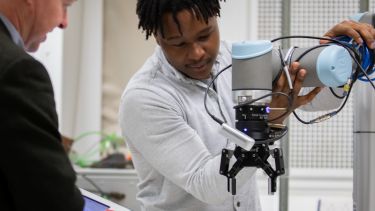Manufacturing Robotics
Sheffield Robotics has a portfolio of research applicable to advanced manufacturing, specifically in relation to robotic control, human-robot and robot-robot collaboration and autonomous manufacturing. Sheffield Robotics is building collaborations with the AMRC, Nuclear AMRC and industry partners.

Automated Assembly
The research within the Automated Assembly encompasses a variety of themes aimed at advancing automation and sustainable manufacturing processes. Key areas of focus include designing for automated assembly and disassembly (design for X), collaborative and industrial robot programming, discrete 3D process simulation, and mobile robotics. Emphasis is placed on sustainable manufacturing through virtual commissioning and generative reconfigurable fixture design. Primary capabilities include multi-platform 3D CAD design, physics modelling, proof-of-concept simulation, build commissioning, and testing. The theme specialises in the mechanical design of bespoke assets such as end-of-arm tools (EoAT) and assembly jigs/fixtures. Furthermore, our expertise extends to mobile robotics, encompassing autonomous mobile robots (AMRs) and mobile manipulators, alongside conducting sustainability assessments and reporting for manufacturing processes.
Automation
The research focuses on various aspects of automation, encompassing precise robotics such as robot machining, advanced metrology techniques, industrial control systems, industrial machine vision, and collaborative automation, particularly tailored for SMEs. Capabilities include secondary encoder robots and a range of metrology equipment like the Hexagon ROMER ARM and Leica Absolute Trackers, along with InSphere's IONA and line scanners. The integration of National Instruments data acquisition tools, vibration sensors, robot machining centres, and expertise in control panel construction are key strengths. The theme also specialises in collaborative robots (Cobots), robot controller systems integration, and PLC programming.
Novel Robotics
The name of this theme highlights its contrast to traditional work at the AMRC and in industry, which predominantly centres around industrial robotics. The Novel Robotics theme focuses on advancing lower TRL (Technology Readiness Level) research, bridging the gap between academic exploration in university labs and making it more industry-ready. It seeks to transition emerging technologies to higher TRLs, aiming for real-world applications in areas such as collaborative workspaces, intuitive human-robot interfaces, and machine learning-driven robotics.
This theme explores cutting-edge areas like open-source robotics frameworks, low-level research in manipulation and control theory, and multi-robot systems, extending even into space exploration and mobile robotics, including drones. It encompasses advanced capabilities, such as deploying AGVs and robots from KUKA, ABB, and UR, leveraging the flexibility of ROS (Robot Operating System), and integrating Beckhoff PLCs for robust control systems within the Sheffield Robotics Network. Robotic simulation and machine vision further enhance the innovative approach to robotics development, positioning this theme at the forefront of robotics research.
Associated Labs
- AMRC
- Robotics & Autonomous Manufacturing Systems Lab: The RAMs Lab provides a hands-on inclusive research environment in robotics and autonomous manufacturing systems to students at the University of Sheffield. The lab is committed to supporting low TRL challenge-driven industrial research aligned with the goals of SoEEE, the AMRC and Sheffield Robotics, with a specific focus on advancing the Autonomous Tool Room grand innovation challenge. Through fostering an inclusive and supportive research environment, the lab aims to support current PhD students, UG and MSc projects and provide a pathway to PhD studies through an undergraduate research assistant programme, ensuring a seamless transition for aspiring researchers. The lab employs a grassroots philosophy and values diversity in skills and strengths, and promotes shared learning.
- Digital Manufacturing Lab
Theme Leads
- Gianmarco Pisanelli is the Technical Fellow for Robotics Research within the AMRC’s Integrated Manufacturing Group. He was awarded an MEng (Hons) in Mechatronic and Robotic Engineering at the University of Sheffield. Gianmarco specialises in early-stage TRL research, with a focus on collaborative workspaces, multi-robot systems, and robotic simulations. He possesses extensive experience in industrial robotics, including PLC programming and the development of intuitive robotic interfaces such as Natural Speech and Augmented Reality.
- As the lead developer for ROS at the AMRC, he serves as the primary point of contact for SMEs and major partners, and represents the AMRC at the ROS-Industrial Consortium. He spearheaded the development of an innovative robotic coil manufacturing method for high-end electrical machines. He chairs the Knowledge Exchange Working Group, organising regular Tech Talks with experts from industry, academia, and research organisations worldwide. He was awarded the UK-RAS Community Award in 2021 for “excellent community-building activities in the RAS Community and beyond”.
Dr Rob Ward holds a joint academic position between the department of Automatic Control and Systems Engineering (ACSE) and the University of Sheffield Advanced Manufacturing Research Centre (AMRC). As an Industrial Research Fellow, he develops, leads and supervises research programmes in self-optimising autonomous manufacturing. Rob is a Chartered Engineer and he brings a wealth of project and operational management experience to support the undergraduate teaching and postgraduate supervision in the dept.
Rob has an MEng(Hons) degree in Avionics and Aerospace Systems from the University of Manchester and a Engineering Doctorate in Machining Science and Control Engineering from the University of Sheffield. Prior to joining the University of Sheffield and the AMRC in 2017, Rob served as an Engineering Officer in the UK Military.




